What is a Private Blog Network (PBN) and is it Good or Bad for SEO?
If you have a website and want to boost its traffic and rankings then you can’t underestimate the importance of link building. It is, after all, one of the top Google ranking factors.
Using a private blog network (PBN) is one of the link-building practices that are often frowned upon. Link-building is not easy and using a PBN is a black-hat strategy that makes it a little easier.
But is using a private blog network good for SEO? Are the rewards greater than the risks associated with using a private blog network? Should you use this shortcut for building backlinks?
Find all the answers you seek in this post. You’ll learn everything you need to know about this controversial link-building tactic and the risks and rewards associated with it. You will also find risk-free alternatives to using a private blog network.
Let’s get started by understanding what a private blog network is and how it works.
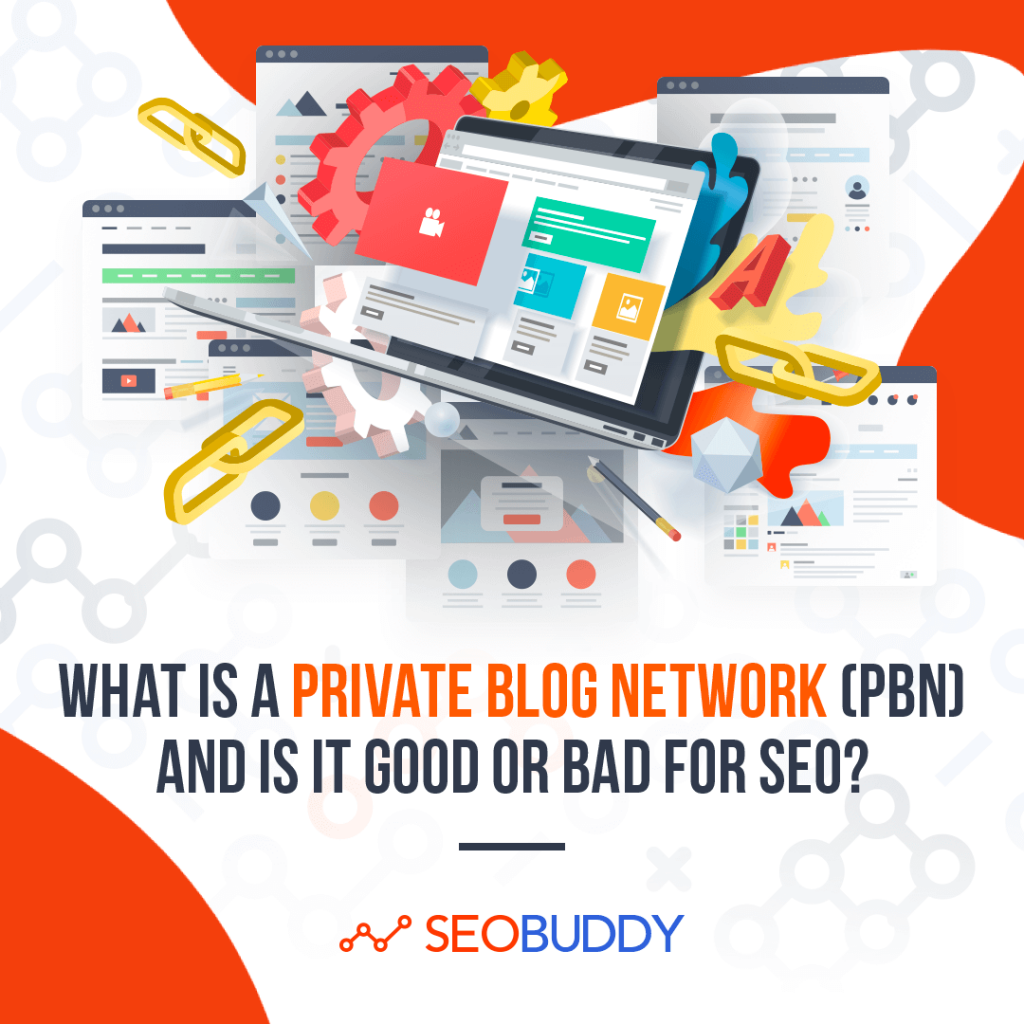
What is a Private Blog Network?
A private blog network refers to a network of blogs or websites that are created specifically to provide backlinks to a central website. The main website is the money-making website while the other sites are just created for link building.
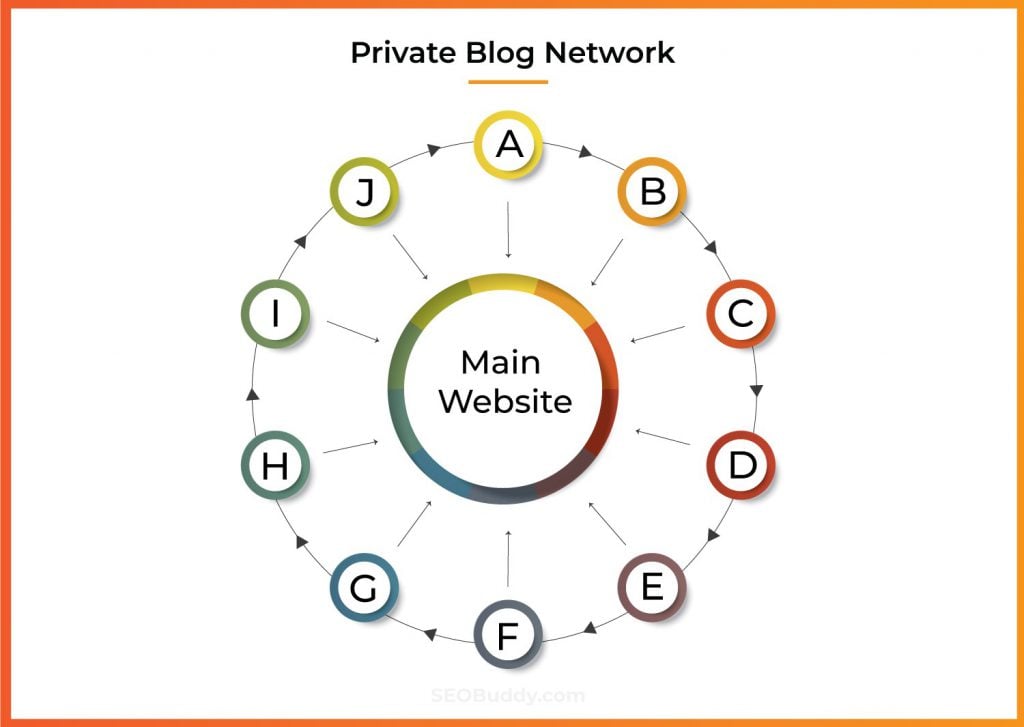
So, the main website will receive an unnaturally large number of backlinks from different websites, in an attempt to manipulate the search engine algorithm and rankings.
Given that private blog network links are not editorially placed, they’re low-quality backlinks and are not good for SEO.
So, why do people use a private blog network to build backlinks?
Let’s find out in the next section.
What are the Rewards of Using a Private Blog Network?
Despite all the chatter on private blog networks being shady and risky, some people still use these. Some have even benefited from using private blog networks.
So, what are the rewards that private blog networks offer that make some people take the risk of using these?
Let’s discuss these briefly.
It’s a Quick Way to Build Backlinks
The most apparent benefit of using a private blog network is that it helps you quickly build lots of backlinks for your website.
And given that backlinks show a vote of trust from one website to another, they do provide a temporary boost in rankings and domain authority. That’s why many people use a private blog network to kickstart their websites and later move to more organic link-building practices.
And it works! At least for some sites that build a private blog network carefully and publish decent content on various websites.
But is it worth the risk?
We’ll discuss that later. For now, let’s continue with the other reasons why people use private blog networks.
It Makes the Difficult Task of Link Building Easier
Earning editorial backlinks is very difficult and requires extremely high-quality content. And even if you do create and publish good content, there is no guarantee that you’ll earn authoritative links, not without proper content promotion.
Most link-building tactics require constant outreach, asking webmasters to link to your content. Whether it’s link reclamation or guest posting, white-hat link building takes time and effort.
Moreover, link-building is unpredictable and even with all these tactics sometimes you just don’t get the best results.
So, using a private blog network is like a shortcut that people take to avoid that much work.
A PBN Gives You Control Over Anchor Texts
Managing a private blog network allows you to have more control over which anchor texts you want for links pointing to your website..
Why does it matter?
Because the anchor that’s used to link to your website shows search engines what topics you specialize in. These signals allow search engines to understand your website and content better.
Also, certain kinds of anchor texts like an exact match or using money keywords are not considered good for SEO. So, having control over anchor texts allows you to manipulate search engine algorithms to a certain extent.
Of course, search engines are good at identifying such maneuvers, but more on that in the next section.
What are the Risks of Using a Private Blog Network?
The rewards offered by private blog networks might seem too good to be true. It is a quick way of building backlinks that actually works.
But that doesn’t mean that there are no risks involved. Before deciding whether you should use a private blog network you should understand the risks and weigh them against the rewards.
Let’s check out some of the risks associated with using a private blog network. Here we go.
Your Site Can Be Penalized
The biggest risk of using a private blog network (PBN) is that Google may identify it as a link scheme and penalize your website.
According to Google, any link-building tactic that is intended to manipulate search rankings is considered link spam.
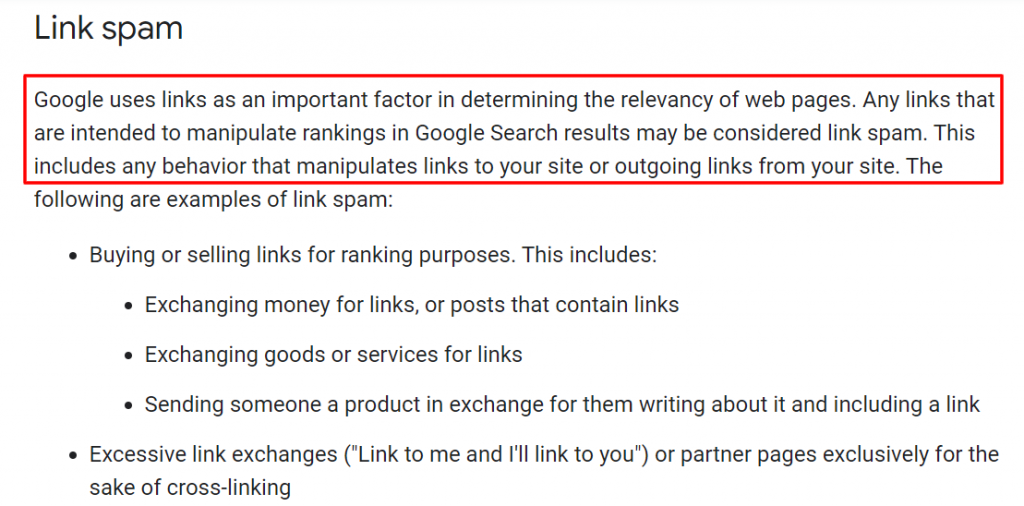
So using private blog networks or PBNs violates Google’s webmaster guidelines and can be penalized.
Why is it so bad?
Because if your site is penalized, you will lose authority and it will definitely hurt your reputation, not to mention site rankings. So, it’s all well and good until Google find out what you’re doing, and then the consequences are really bad.
Your Links Would Be Ignored
Penalties are not the only action Google or other search engines can take when they identify unnatural link-building practices.
They can simply choose to ignore your PBN links and not allow them to contribute to your site rankings. This is also called an algorithmic adjustment and is quite common.
Any links that Google deems unnatural, it can simply ignore without giving you any warning.
What does this mean for SEO?
It means that all your efforts go to waste and the PBN links you built won’t make any difference in your site rankings. What’s worse is that you won’t even know about it to take any corrective action.
You Would Weaken Your Link Profile
Another risk associated with using a private blog network is that the links earned are typically not of good quality. So, you will build tons of low-quality links and that may give a temporary advantage, but it’s not good in the long run.
Building a strong link profile with earned high-quality links is a long-term process. By adding too many low-quality links to your profile, you may weaken it. That’s not good for SEO, at least not in the long term.
You can also use this link-building checklist to ensure that you follow ethical tactics and build high-quality backlinks that strengthen your backlink profile.
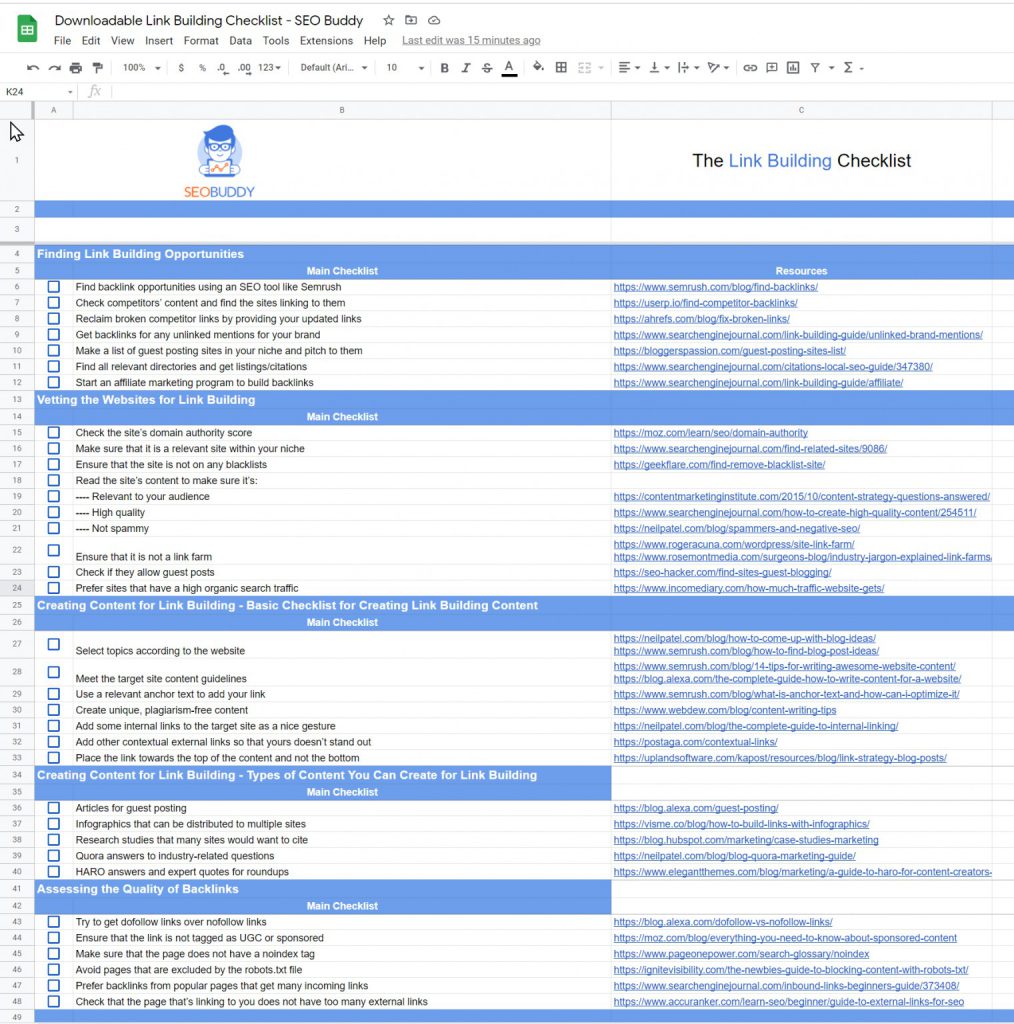
The Verdict: Is a Private Blog Network Good or Bad for SEO?
So, now you understand the benefits and risks associated with using a private blog network (PBN).
It may work for a short time and give you a temporary boost in rankings, but does more harm than good in the long term.
Does this mean you should absolutely not use a private blog network?
Not necessarily.
While we do not recommend using a private blog network or have ever used one, there are people who have mastered the art of using a PBN to their advantage.
However, a PBN can only be successful if you post good content on all websites and place contextual links on relevant anchor texts.
For instance, consider a large media or publishing site with several sister concerns with their own websites. In this case, all the websites are legit and cater to a specific audience, while also linking to each other in a relevant and contextual manner.
This is probably one of those rare cases where a private blog network may work.
But, in most cases, using a private blog network is risky. Building and maintaining a single website is a humongous task, let alone maintaining a network of sites.
So, our final verdict is not to use a private blog network as the risks outweigh the benefits.
Debunking the Myths Related to Private Blog Networks
While we don’t endorse or recommend using private blog networks (PBNs), it’s important to debunk some of the myths relate to them.
After all, you should have all the information you need to make a decision for yourself.
So, here are some of the common myths about private blog networks (PBNs) and the actual truth behind those myths.
Let’s get started.
1. A Private Blog Network Can’t Help You Improve Your Rankings
The most common myth associated with using a private blog network is that it’s spammy and cannot help you improve your SERP rankings.
The SEO purists are especially the ones who make absolute statements like:
- Using a private blog network is wrong
- It will never help you boost rankings
You need to take such statements with a grain of salt and verify their validity.
So what’s the truth?
Let’s find out.
Truth
The truth is that even though it may be a shady tactic, it can work in the short term. Using a private blog network can boost rankings in the short term.
However, given the risks involved, there are chances that you will get caught and penalized. This will adversely affect rankings.
So, the truth is that using a private blog network can boost rankings in the short term, but usually hurts rankings in the long term.
2. If a Company Owns Multiple Sites it’s a Private Blog Network
There are many big companies that own multiple sites that link to each other. The best example would be big publishing houses or media sites with several publications under their umbrella of brands.
Different sites owned by a single company would, of course, link to each other. Some people worry that such sites constitute a private blog network.
However, that’s a myth.
Truth
If these sites add contextual links to relevant resources on other sites, then these do not form a private blog network.
A private blog network comprises sites that are created for the sole purpose of building backlinks for one or two money-making websites.
As long as that’s not the case, owning multiple websites that sometimes link to each other is perfectly acceptable and ethical.
3. Google Can Easily Identify Private Blog Networks
One of the most common myths associated with the use of a private blog network is that search engines can identify one very easily.
Most SEO purists who advocate against using a private blog network, use this argument to dissuade people from using a PBN.
Truth
While Google continually develops and improves its algorithm, it’s not all-knowing. It’s not easy to detect a private blog network, even for Google.
Badly designed networks that share duplicate content, share an IP address, and common registration information can be easily caught. But SEO experts have figured out numerous ways to remove these digital footprints that point to a PBN.
So, it’s actually quite difficult for search engines to identify a well-planned private blog network, but the chances are still there.
How to Spot if a Website is a Part of a PBN
Sometimes you may unintentionally get backlinks from a private blog network. It could be one of the sites where you guest post or one that reaches out to you for a link exchange.
It’s, therefore, essential to spot a private blog network and vet any websites you associate with. Here are some quick tips to spot if a website is a part of a PBN:
1. Site Ownership Information
The first thing you should check if you doubt that a website is a part of a PBN is its WhoIs information. If a site is not disclosing this information or keeping it private, then that’s cause for doubt. Most legit websites will provide the owner’s details.
Please note that this is not a sure way of detecting a PBN as some people might have other reasons to not disclose their information.
2. Domain Authority or Domain Rating
Generally, sites within a private blog network will have low domain authority and rating.
However, many people have found a way around this by buying expired domains with some authority. So, the next best thing you can do is check the domain history and see if it was an expired domain.
3. Content Quality
Given that the sites in a private blog network are created solely for link-building purposes, they generally don’t put a lot of effort into content quality.
Just go through the content on a website and if you find very low-quality content, chances are that it might be a part of a PBN.
Pro Tip: Even if a site is not a part of a PBN, it is a good practice to only build backlinks from websites with high-quality content.
4. Backlink Profile
As mentioned earlier, many PBN owners buy expired domains with existing backlinks. But they will not usually make the effort to create a page for every backlink pointing to the website.
So, the presence of too many broken links is a sign that the site may be a part of a private blog network. You can use Ahrefs Broken Link Checker tool to quickly get this information.

5. Monthly Traffic
Private blog networks generally tend to have low or no traffic, despite posting a lot of content meant for link-building purposes. So, you can analyze the traffic data of a website that you doubt is part of a PBN to get more information about it.
If the website traffic is conspicuously low, then the chances are that it is a part of a private blog network.
Now that you know how to spot a PBN you will be in control of your link-building efforts. Next, let’s discuss some risk-free alternatives to using a private blog network.
6. Varied Topics
Many private blog networks have no clear editorial direction and may post content on varied topics. The same site could have articles related to food and travel, as well as science, medicine, technology, etc.
If you spot a website that posts content on random, unrelated topics, without a clear editorial direction, chances are that it is a part of a private blog network.
Please note that some websites cater to multiple topics and usually have multiple categories for their blog. Such sites are legit and not a part of a PBN.
The difference between the two is that PBNs will have random, unorganized content on unrelated topics that are not properly categorized.

Now it’s time to discover the other 102 steps that will get more organic traffic flowing to your website. Get the SEO Checklist here.
Want to get a sneak peek of what it looks like?
Enter your email and get a free demo version of the SEO Checklist.
What are the Risk-Free Alternatives to Using a Private Blog Network
Using a private blog network is a shortcut for link building, but one that’s too risky to use. If you want to build backlinks in a sustainable manner, there are many other alternatives to using a private blog network.
Here are some white hat link building tactics that you can use to build high-quality backlinks from relevant and authoritative sources.
1. Guest Posting
Writing relevant and useful guest posts for other websites and blogs in your niche is one of the most effective ways to build high-quality backlinks. But it is also a long-term strategy that takes time and effort to pay off.
Why, then, should you bother to do this?
Because it will not only help you build links, but also establish yourself as an expert in your niche.
Posting on other high-quality sites gives you access to their audience and if you do a good job, they will follow your links and check out the content on your website.
This helps build links, boost referral traffic, establish authority, and even affects the domain authority in the long term. So, guest posting is the most steady and sustainable way to build high-quality backlinks.
2. Infographics Distribution
Creating and distributing infographics is a quick and effective way to create multiple backlinks from authoritative sites, without too much effort.
Unlike guest blogging, you don’t need to create fresh content for each site, and can distribute the same infographic on multiple sites.
Basically, you give other sites the right to reshare your infographic in exchange for a link to the original infographic.
Here are some tips for infographic link building:
- Choose a trending industry topic that most websites in your niche would want to post about.
- Conduct thorough research and create an infographic that provides useful information in a concise and visual manner.
- Write a short infographic description for each site where you share your infographic and add a backlink to a relevant resource on your website.
- To make your infographic more credible, always add data sources below the infographic.
Here’s an example of an informative infographic:
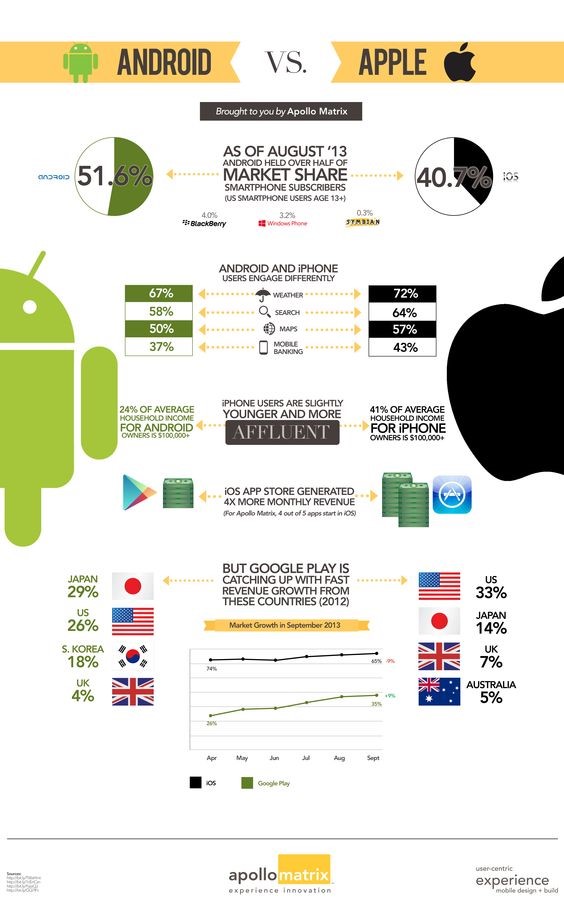
3. Answering Questions on Online Communities
If you are looking for quick link-building tactics that require minimal effort, then this one is the best alternative to using a private blog network.
How does it work?
Here’s a step-by-step process:
- Join online communities like Quora and Reddit
- Find questions related to your niche or area of expertise
- Answer questions in a way that provides value to the readers
- Add a link to a relevant resource on your website that can provide more detailed information about a particular question
- Keep answering to build your audience, while also building backlinks
Pro Tip: Respect the community guidelines and strive to provide value through your answers to use this strategy to your advantage.
4. Writing HARO Answers
This is similar to the previous strategy, except you need to join the HARO (help a reporter out) platform and will get backlinks from authoritative sites, not online communities.
So, what is HARO?
It is a platform where reporters come to seek expert advice and answers for topics that they’re writing about. The reporters will post questions on various topics and seek expert answers.
As an expert in your niche, you can register on the platform and choose your areas of expertise. You will then be able to see questions that reporters have posted within your niche.
Choose the questions that you think you can answer well and add a link to a relevant resource within your answer. This will direct people to your website to learn more about the topic at hand.
Remember, only add contextual links to content that is related to the topic for which you’re providing an answer.
5. Earning Editorial Links
This is probably the hardest way to earn backlinks, but the most powerful as well.
Editorial links are links that other sites provide freely because they find your content valuable. Such links are earned and not bought, making them the most difficult types of backlinks.
While some types of backlinks like Edu backlinks or Gov backlinks are the most valuable, they are very difficult to earn.
So, instead of targeting these, you can try to get editorial backlinks from authoritative sites within your industry or niche.
How can you do that?
Create share-worthy content that organically gets links and mentions. Here are some examples of the type of resources you can create to earn editorial backlinks:
- Detailed evergreen content
- Ebooks
- Whitepapers and original research
- Survey results
- Compilation of statistics
- Free and useful tool
Pro Tip: Just because editorial links are earned doesn’t mean you can’t let people know that you’ve created some share-worthy content that they should check out. So, market your top content and resources to earn editorial links.
How Can You Identify and Remove Unnatural or Spammy Links?
Even if you’ve never willingly participated in any black hat SEO tactics, you may still have some spammy links from your website. These toxic backlinks can be from a private blog network, spammy sites, blog comments, and other sources.
To ensure that your backlink profile is clean, you need to first understand what types of backlinks are considered bad and then identify and remove them.
Here are some common types of toxic link-building tactics that you should avoid to maintain a good backlink profile.
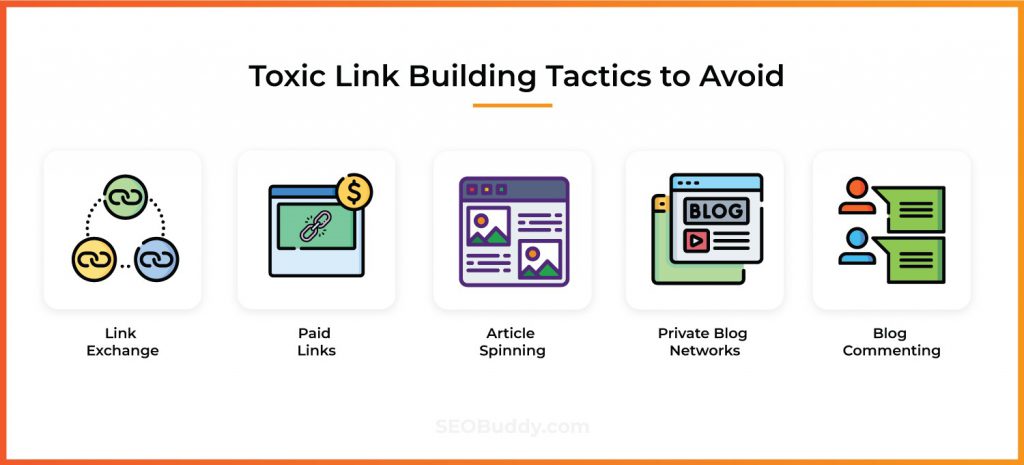
Now, coming to the part about identifying and removing bad backlinks.
Use a tool like Semrush or Ahrefs to conduct a thorough backlink audit of your website from time to time. These tools will help you analyze your backlink profile, assign it a toxicity score, and flag unnatural or toxic links.
Semrush, for example, will give your link profile a score and mention the reasons why some links might be dangerous.
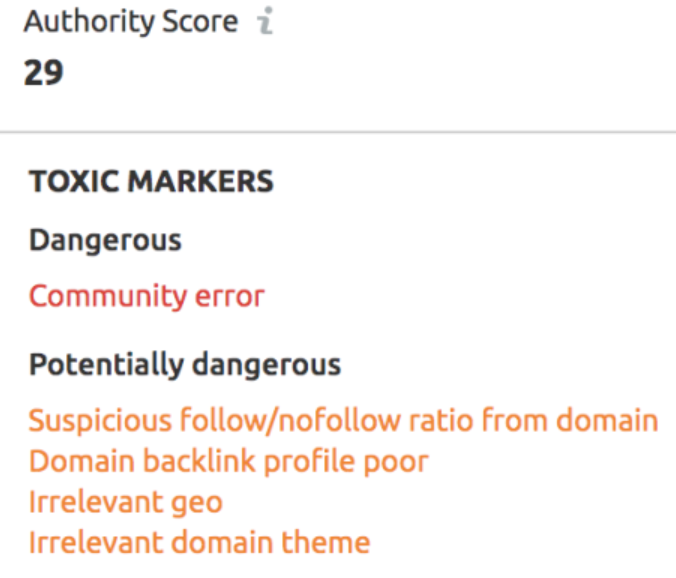
It will also give you a list of links that it considers bad. You can use the Google Disavow tool to disavow these backlinks. Alternatively, you can reach out to the webmasters of these sites and ask them to remove the backlinks permanently.
FAQs
1. What is a private blog network (PBN)?
A private blog network is a group of websites that are created with the specific purpose of manipulating search engine rankings for one or two main websites.
The network would usually have several sites that give out links to one or two money-making websites. It is a shortcut for building links and is used to quickly build backlinks for a new website.
2. What are the benefits and risks of using a private blog network?
Here are the key benefits of using a private blog network:
- It can give a quick boost to your site rankings
- You can use it to jumpstart your link-building efforts
- It is easier than guest blogging or other white-hat link-building tactics
- A PBN allows you to control and manipulate the anchor texts used for link building
Here are the key risks associated with using private blog networks:
- If Google catches you, it can penalize your website
- Search engines can simply ignore any unnatural links on your site, adversely affecting your search rankings
- Adding too many low-quality links to your site can weaken your backlink profile
- It can hurt your SEO in the long run
3. Is a PBN good or bad for SEO?
Using a private blog network can provide short-term SEO benefits but is generally bad for SEO in the long term. The risks of using a private blog network far outweigh the benefits and can cause serious damage to your SEO and reputation.
Overall, using private blog networks is bad for SEO.
4. How can I identify a private blog network?
Here are some tips to identify a private blog network:
- Check the hosting information and if several sites have the same IP address, then they may be a part of a private blog network.
- Most sites within a private blog network will have low domain ratings. While this is not a sure test of identifying a PBN, it is one of the factors to consider.
- Check the “WhoIs” information of various sites that you doubt form a PBN and if the site ownership information is the same, then it is likely a PBN.
- Private blog networks usually have low content quality than genuine blogs, so check for that to identify one.
5. Should I use a private blog network for a quick boost in rankings?
While that is completely your choice, we would advise against it. Using a private blog network is generally bad for SEO in the long term, even if it may have some short-term benefits. However, if you are keen on using private blog networks, then do so smartly and avoid leaving any footprints that can link you to one.
Final Thoughts
Though many people use private blog networks and benefit from them, we would still advise against them. SEO is a long-term game and using shortcuts like a private blog network is a temporary fix to a long-term problem.
We recommend using more effective link-building techniques that can help you get high-quality backlinks from authoritative sources.
Need an ethical shortcut that can help you get high-quality backlinks quickly?
Use our comprehensive Link Chest that will give you access to 2200+ link-building opportunities with high DA sites. And if you need help with other aspects of SEO, then get our SEO Checklist that will help you take your SEO game to the next level. All the best!




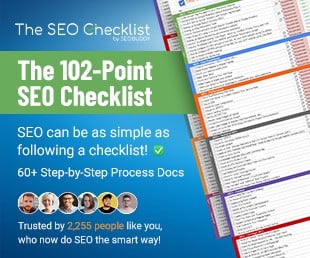
Excellent post!